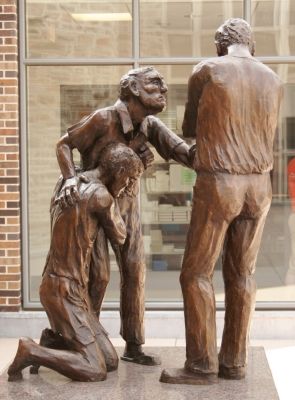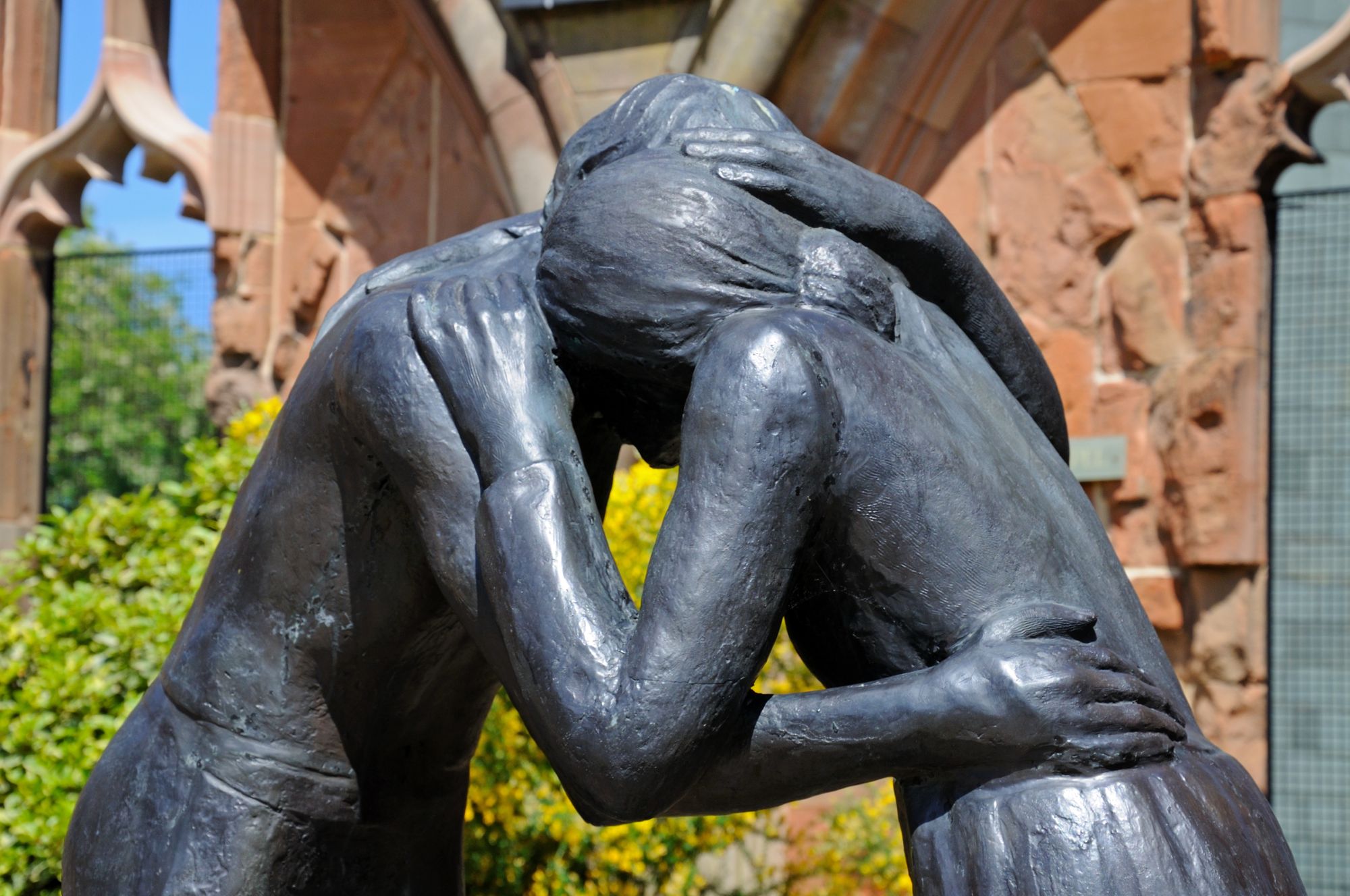In moments of touching honesty, many folks have told me heartbreaking stories of estrangement. Long ago, something happened between them and a family member or friend. They forgot the details, but they remember the wound. The wound festered and damaged their relationship. Where once there was warmth and intimacy, there now is detached coolness or hostility. God blessed some with a scar. But for many, it's evident that the wound remains raw and unhealed. Their eyes mist with as they speak of the pain.
I have such stories, too.
One of the stories we tell ourselves is that broken relationships are part of life and seldom meaningful beyond our private spaces. That story may help us move on. But it may also justify our unwillingness to do what's needed to repair the relationship.
The stories we create have common refrains. It's nobody's business if I nurse my anger. It's nobody's business if tears soak my pillow each time memory of the breach breaks my heart. It's nobody's business if I occasionally drop emotional bombs on the person who did me wrong. It's a private affair.
Only it isn't.
The fallacy in such claims is that it forgets that our relationships are how Christ is healing the world. Our mission is to live in holy friendship with God and each other. That's our role in Christ's ministry of reconciling the world to its Creator. As noted in The Art of Prayer, "relationships with God and each other constitute life." Our relationships matter to our families and friends because they are the means through which we embody Christ so that his love heals the world.

Our relationships are gifts of enormous significance. That's why Jesus teaches us "that everyone angry with their brother or sister will be in danger of judgment." He then elaborates, saying, "when your brother or sister has something against you us, leave your gift at the altar and go. First make things right with your brother or sister and then come back and offer your gift" (Matthew 5:22-24).
We can easily miss the tremendous importance Jesus assigns to our reconciled relationships because his listeners' context is not self-evident to our 21st-century minds. So let's do the math. For his Jewish audience who lived in Galilee, there was only one altar. They took their offerings for each of the major feasts to the Temple in Jerusalem. The distance from the Sea of Galilee to the Temple is about 90 miles. If one lived further north in Galilee, the journey could be 110 miles. Traveling on foot at a formidable pace of 16 miles per day over rugged terrain would take 5-6 days. Most caravans covered the distance in a week. So, in context, Jesus taught his disciples that, having journeyed at least 90 miles to the Temple already with their gifts, they should return to their Galilean village, make things right with the aggrieved neighbor, and only then return to the Temple to make things right with God. And, of course, one didn't travel safely except by caravan. Jesus tells us to go the distance, for broken relationships are an essential communal concern.
Our reconciliation takes precedence over our worship. Our broken relationships matter to our Lord because they impede his work of reconciling the world.
When I think of reconciliation, my mind first turns to Jesus' parable of the prodigal sons (Luke 15:11-32). I then turn to how Jesus instructed Christians to handle the conflict that arises when we sin against each other (Matt 18:15-18). This teaching is sandwiched by Matthew between two challenging parables about forgiveness, reminding us that our reconciliation practice is itself made possible and patterned on the forgiveness that characterizes the Father's nature and posture towards us. The process of reconciliation Jesus outlines for his followers presupposes that we embody a mutual commitment to forgive each other that precedes the many ways we subsequently sin against each other.
Jesus teaches us a civic liturgy that I call the 'dance of reconciliation.' It only achieves its end of healthy, sustainable communion if all parties are committed to dancing together.
In part 1 of this two-part series, I will address the dance steps when we cause a brother or sister to have something against us. In part 2, I'll focus on the steps we take when we are the injured party.
Jesus begins with an essential first step in that dance:
If your brother or sister sins against you, go and correct them when you are alone together (v15).
Since I am speaking not in the abstract but about real actions that cause consequences for each other, I don't want to presume that the word 'sin' is exact. In this context, 'sin' denotes those actions that miss the mark in that they produce an impact on the other that he experiences as a non-edifying wound.
That excludes motivation from the equation. The question of sin is about our impact, whether we intend that impact or not. So, borrowing from Torah, if I accidentally kill my neighbor's cow, and I deprive my neighbor on an ongoing basis of milk as well as his relationship with that cow and that cow's potential offspring, I give my neighbor cause to have a grievance against me.

Notice the role of good intentions here. Even if my intentions were good, I've caused damages. I've impeded God's providential care of my neighbor. I wound both God and my neighbor and thereby sin. So, 'intent' is immaterial in determining if I sin or whether I have to make things right with my neighbor.
If intent matters, it matters perhaps in my neighbor's thinking about what will suffice to make things right. My intent does not free me of responsibility and accountability to God and my neighbor for the wound I caused, but understanding it may empower my neighbor to be merciful toward me.
In his Sermon on the Mount, when Jesus taught us to go and make things right with our neighbor before we go to the altar of God to commune with him (Matt 5:22ff), he refers to Torah, specifically Nu 5:6-8 (Cf. Lev 6:4-5).
When a man or a woman commits any sin against anyone else, thus breaking faith with the LORD, that person becomes guilty. Such persons will confess the wrong they have done. Each will make payment for his guilt, add one-fifth more, and give it to the injured party (Nu 5:6-8).
A mere apology is insufficient. So too is merely restoring things to the way they were (e.g., neither returning nor replacing the cow suffice). In the dance of reconciliation, things never go back to the way they were before but always drive forward to a more vital, healthier relationship.
For that reason, making things right means the offender remorsefully makes reparations plus 20% more. The guiding principle is that the offender not only makes restitution but goes beyond by a fifth. In other words, he corrects the damage he did and also takes on a share of the distress he has caused.
While this addresses the harm done from the injured party's perspective, the principle has another essential role. It deals with the torment that takes hold of the offender's conscience once she comprehends the wound she has caused and its damaging effects. It provides a means for the offender to respond more fully to the damage she has done, bringing a measure of closure and peace.
This reparation offering is for both parties and also the community of which they are part. It expresses God's mercy in that the wound and its pain are addressed and not allowed to fester and metastasize into something far more toxic to them and their community.
It's easiest to think about this in the example of impacts involving tangible harms, such as killing a neighbor's cow. But how do we apply the principle in the case of intangible injuries, such as when we break someone's heart? The same concepts apply. The art lies in both parties' imagining that sufficient offering that symbolically makes restitution. We know we've imagined that well when we share the fruit of peace.

For me, intangible harms - like my failures to love or respect another as they wish to be loved or respected - are the most difficult wounds to address. I can compute a cow's price and find the funds needed for reparations, but how do I cure injuries caused by words I've already unleashed or neglected to express until after their freshness date expired? How do I imagine a sufficient offering when another experiences disrespect or injustice when I intended neither and cannot fathom their resentment? Untangling such things feels too hard, too risky, and takes too much time. I'd rather not be bothered. I'd instead do the minimum and move on.
Instead of discerning the nature and impact of my sin, I have often substituted an "I'm sorry and let's move on" and urged both sides to perform a different dance that claims that the digging into our wounds is not edifying. But "I'm sorry" is not repentance, for repentance requires the naming of discrete behaviors from which one will turn around. Without repentance, "I'm sorry" cannot do its redemptive work. Alone, it does not lead to peace; it impedes peace by neglecting the essential step of discernment that leads to shared wisdom, new creation, and most importantly, trust.
Jesus does not promise - nor should we expect - that we will enjoy the fruits of reconciliation and restoration of full communion until we complete the steps of:
- Discernment and naming of how we experienced sin.
- The expression of sincere remorse and the offering of reparations for our impact on the injured party.
- The naming of our commitment to repent of the specific behaviors that led to that impact.
If we have done harm to another, we have to do the whole dance to make things right. The first step is to clarify the impact and its root cause. Our next step is to share in the distress we have caused by being allowed to present our "reparation offering" that both parties recognize as God's merciful means of grace. The final step is to practice the art of the turn - to make the course correction needed so that the impactful behavior does not happen again.
This God-given means of resolving conflict is the practical meaning and discipline underlying our liturgical sharing of God's peace with each other before we break bread at the celestial banquet. Jesus tells us to abstain from approaching the altar to join him in feasting until we have made things right with our neighbor.
There is an urgency in making things right, an urgency because the community's health depends on the timely resolution of conflicts that arise from our inevitable sins against our friends and family. Jesus is clear that it is impossible to enjoy the gift of His peace until we are at peace with our neighbors. The dance of reconciliation is his instruction on cooperating with the Holy Spirit to repair and sustain that peace.
In part 2 of this series, we will turn attention to the steps we take in the dance of reconciliation when we are the injured party.


